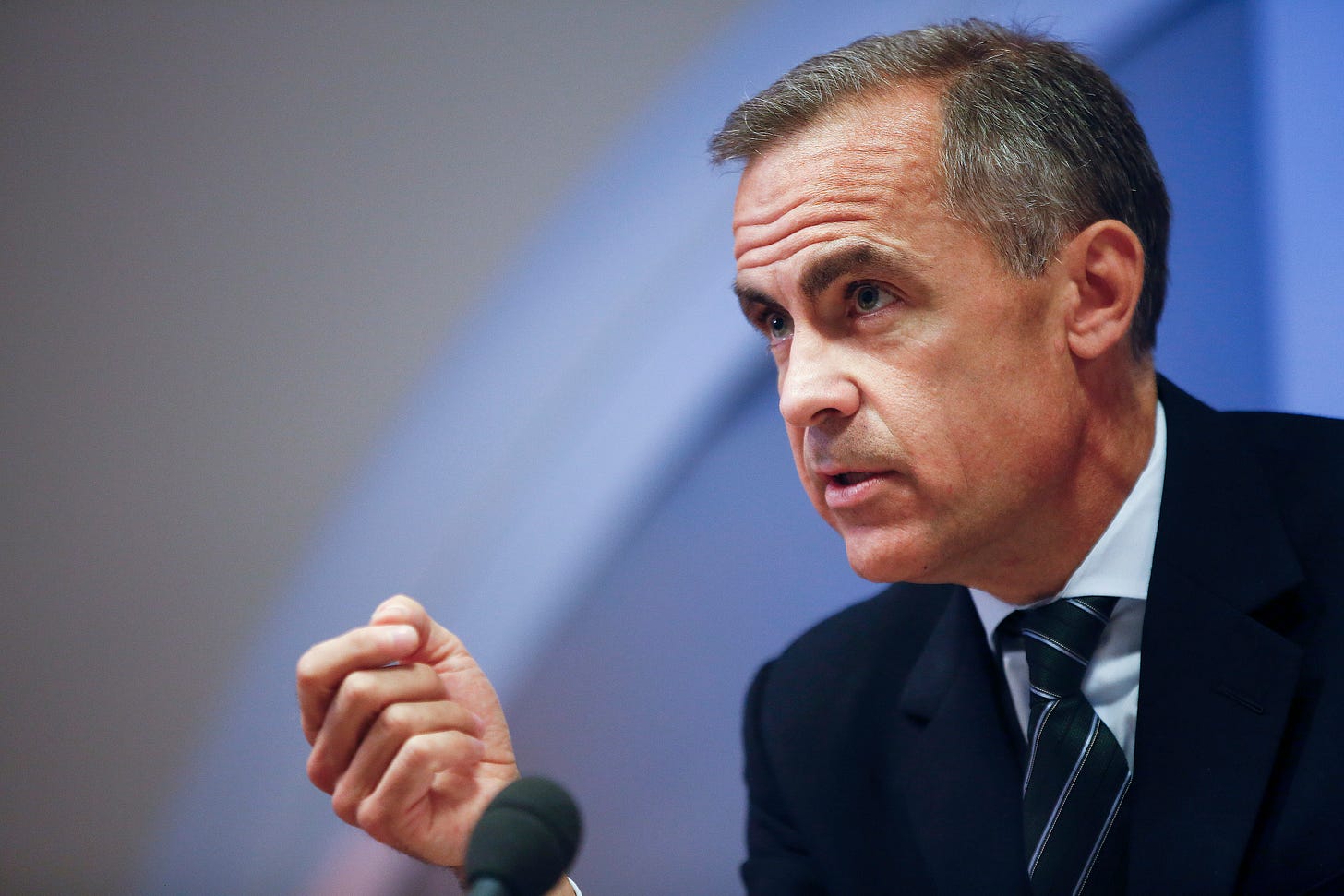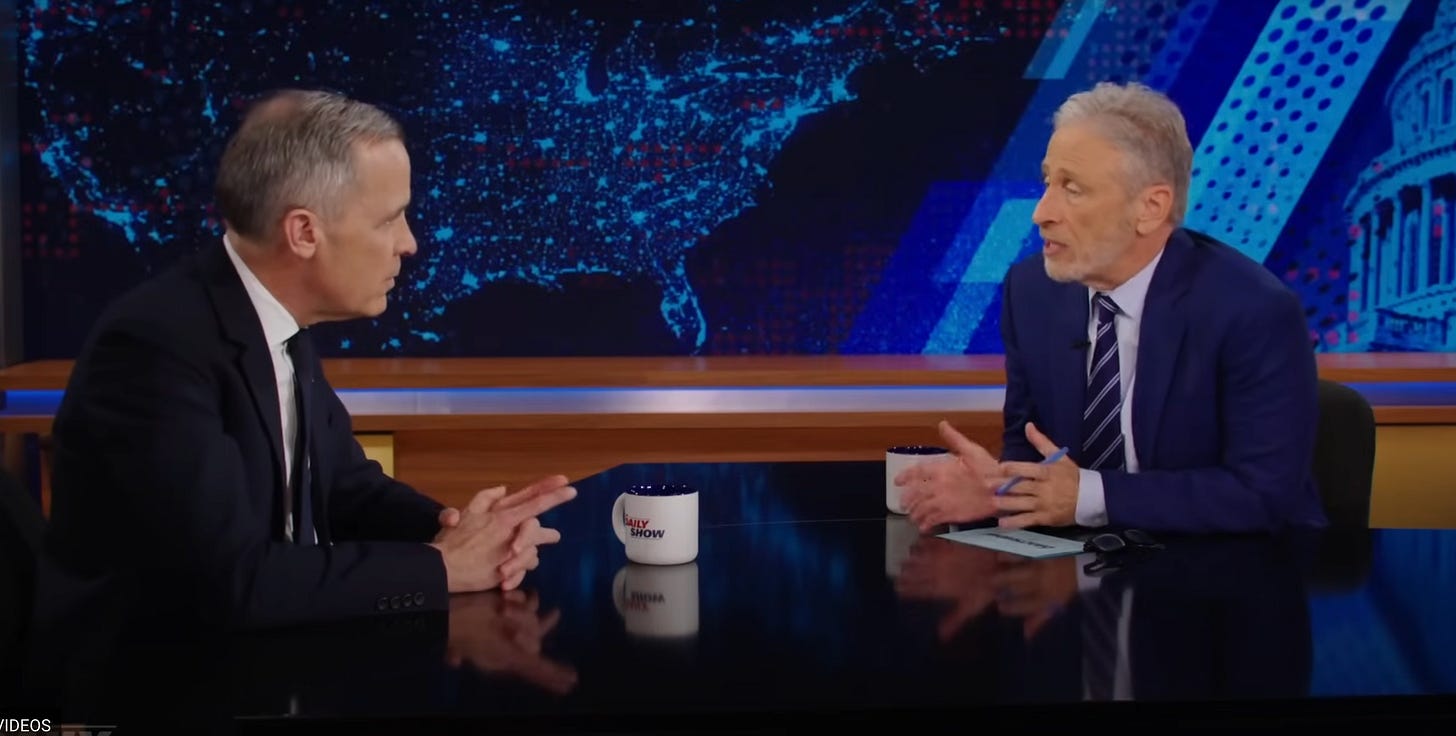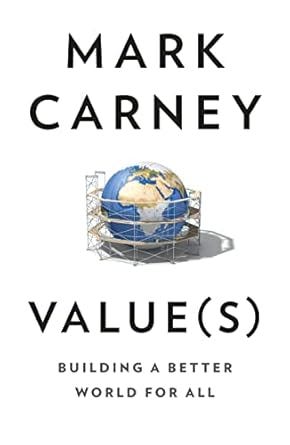The problem with Carney-ism
Economic questions are unavoidably political ones, and minor technocratic adjustments don't work when the system itself is fundamentally broken.

There’s a somewhat throwaway scene in NBC’s The West Wing (longtime readers/listeners, do forgive me) that captures something important about the liberal political imagination. The context itself isn’t hugely relevant. But, in brief: President Jed Bartlet — a Nobel Prize-winning economist, because Aaron Sorkin can’t resist affixing as many credentials to his protagonists as possible — is discussing an earlier meeting with his advisors:
That session this morning with the advisors; everybody's got a magic lever they want you to push. I studied economics all my life but in this job only a fool is ever certain. You don't push any one lever; you wanna push a little on them all.
“Every theory in moderation…”, agrees Bradley Whitford’s Josh Lyman. This is the centrist liberal outlook in miniature.
In the centrist imagination, governance is largely a matter of applying highly specialized technical expertise. It’s an enterprise of management whose processes are at once subtle and obscure; a domain of discrete puzzles whose solutions are both intricate and abstruse. When it comes to fundamental questions of economics or politics, the ship of state is to be steered only by way of minor course corrections or it will inevitably capsize.
Over the past four decades, as the horizons of political and economic discourse have steadily narrowed, something like this idea has come to predominate. In 1997, one of the first big moves of Tony Blair’s New Labour government was to give the Bank of England “independence”, in effect the prerogative to set interest rates on its own. Viewed this way, economic management and finance essentially exist outside the realm of politics altogether. It’s common, in fact, to conceive of finance ministers themselves in the same fashion: two of Canada’s recent finance ministers — Bill Morneau (a Liberal) and Joe Oliver (a Tory), for example, were recruited directly from the business world with this very idea in mind.
In 1970, Ed Broadbent summed up the technocratic approach to economics this way1:
Economic decisions…are entirely in the realm of facts. The right economic policy is the one which "works". Economics is a value-free science studied and applied by the esoteric few who run our corporations or direct our bureaucracies. The Canadian economy is seen as some kind of cumbersome automobile requiring knowledgeable technicians in white coats to keep it running. Politicians at best should keep their hands off it. At the very worst they should pay strict attention to their experts: in no case should they make their own "technical" decisions.
Value(s)
Mark Carney, a former Governor of both the Bank of Canada and the Bank of England, and now also the presumptive frontrunner in the race to lead Canada’s Liberal Party is a superlative embodiment of the view just described.
Unlike Oliver, Morneau, current UK Chancellor Rachel Reeves (who he incidentally endorsed ahead of Britain’s most recent general election) or plenty of others in the same mould, Carney is a slick and rhetorically conscious politician who has long grasped the utility of making the worlds of economics and finance sound a little less bloodless. He comes across as a sincere believer in liberal capitalism: someone deeply (and perhaps fatally) invested in its foundational narratives and assumptions — capable of recognizing unfairness and injustice yet unable or unwilling to see them as the inevitable byproducts of the very system he embraces.
Back in 2011, he called the Occupy Wall Street protests a constructive response to rising global inequality. The following year, he addressed the annual convention of the Canadian Autoworkers Union (CAW) and in one of his 2020 BBC Reith Lectures explored various market-based solutions to climate change. Right from its title — Value(s): Building a Better World for All — Carney’s 2021 book advances the seductive idea that our ruling economic order might be supplemented with a patina of ethics and social compassion (“value”, in the cold market sense finding a partner in “values”, i.e. more laudable principles that guide us).
At the same time, he is someone who reflexively espouses the language of coolness and moderation and has never for a moment behaved in ways likely to make institutional power even slightly uncomfortable. (Carney was, as he himself recently revealed, invited to join the cabinet of none other than Canada’s former Conservative Prime Minister Stephen Harper as Minister of Finance.) Launching his campaign for the Liberal leadership last month, he took aim not only at the Conservatives but also at what he (somewhat vaguely) called “the far left”:
Just as Pierre Poilievre’s soundbites won’t deliver for Canadians, we can’t achieve our full potential with the ideas of the far left. They too often see government as the solution to every problem, with a reflex to spend and subsidize that just treats the symptoms of the problems but doesn’t cure the disease. We can’t redistribute what we don’t have, and we can’t support the vulnerable or defend this great country if we have a weak economy. And I’m here to build the strongest economy for all Canadians.
He is running as a self-described “outsider”, which is accurate insofar as the word can possibly describe a former Governor of two national central banks whose most recent job title was “Vice Chairman and Head of Impact Investing” at a global financial institution with nearly $1 trillion in assets. And, if the available polling is to be believed, he not only enjoys a big advantage over his only real rival Chrystia Freeland, herself a former Minister of Finance — Freeland resigned in theatrical fashion at the end of last year to prepare a leadership bid — he would put the Conservatives on notice in a federal election.
These kinds of hypothetical or speculative polls should always be taken with a grain of salt. But Carney’s rise has nonetheless been meteoric for someone who has never held elected office, and his political appeal is — for many at least — quite real.
A man for all seasons
What, then, is the nature of Carney’s appeal?
To a certain extent, the answer is specific to Canada’s current political context. The Conservatives, generally disliked by roughly 60 percent of the electorate at any given time, have led by double digits for much of the past two years with the Liberals under Justin Trudeau growing increasingly unpopular and poised for a wipeout. With Trudeau’s pending retirement coming amid Donald Trump’s trade war and periodic annexation threats, the political dynamics have shifted quickly ahead of a soon-to-be-held federal election (for those who may have missed it, I wrote about this in early February). If the structuring theme of Canada’s political climate was until recently one of generalized frustration and insecurity — thanks largely to the spiralling cost of living and public fatigue around Trudeau’s leadership — it has since become something closer to existential anxiety and fear.
Canadians overwhelmingly dislike Trump and favour a strong national response of some kind to his threats. As David Coletto argues, what looks to be an improbable Liberal recovery in the polls is being driven heavily by voters over 60 — who are now more than twice as likely to vote Liberal than younger members of the electorate.
Carney has stepped into this mix as a tabula rasa in many ways perfectly positioned to exploit the moment. He is a Liberal, but largely one unassociated with the Trudeau government. He hails from the world of finance and projects an image of technocratic competence but is also someone who goes on The Daily Show and supplements this image with a comforting pitch that sounds compassionate and reassuring. He is, like the most effective centrist politicians, a veritable man for all seasons: a figure adept at splitting the difference between the rhetorical registers of centre left and centre right who can, to a very real extent, symbolize whatever you want or need him to.

In politics, as in marketing, this is the oft-elusive sweet spot for all brands: specific enough to convey solidity and authenticity, but also broad and open-ended enough to garner wide appeal. (I think here of how Thomas Mann describes the fictional writer Gustav Aschenbach in his 1912 novella Death in Venice: “Equidistant from the banal and the eccentric, his talent seemed tailored to gain both the confidence of the general public and the demanding admiration of the connoisseur.”)
Lest I sound too glib about all this, there is something intuitively, even spiritually appealing about the centrist narrative of politics — especially in moments of deep uncertainty. In Value(s), Carney readily acknowledges the crises and market failures that have exacerbated social and economic inequality, while at the same time positing markets and profit-driven private enterprise (albeit a more “enlightened” version of it) as the solution:
Profit is essential but it must be achieved in a manner that creates shared value for all stakeholders…a company’s highest purpose is to provide solutions, in a profitable manner, and contribute in its own way to the betterment of society.”
The notion there’s some golden mean to be found between the dictates of capitalist enterprise and the ethical demands of a just society is as psychologically compelling as it is intensely marketable. When you add to it the related idea that economics and governance are fundamentally questions of management and discrete technical expertise, the resulting narrative of politics is, if nothing else, a highly comforting one — especially if you’re a middle class person who craves stability and reassurance.
It’s also dangerously incorrect. It goes without saying that large bureaucracies — whether central banks, government departments, or multinational financial institutions — necessarily run on highly specialized expertise and require complex systems of management. But questions of economics are fundamentally and unavoidably questions of politics. Ed Broadbent again:
[the technocratic view of economic management] is wrong because the technicians take orders from the politicians whether they like it or not; the car must run in some direction, and the politicians are empowered to decide where. It is dangerous because it ignores the human consequences of economic policies, ignores the fact that deliberate and full-scale social consequences are implicit in every economic decision. When we adopt any economic policy we are deciding in favour of one kind of society and against another kind, and we owe it to ourselves to be quite clear about this. Technical knowledge is relevant but the same knowledge applied differently produces differently.
Running an economy, then, is not a purely technical matter because it entails choices that inevitably reflect value judgements. In a democratic society, we should be electing leaders on the basis of where they intend to steer the ship, not simply because they’ve mastered use of a compass or know how to interpret the information found on an existing navigational chart.
Building a better world, a few gentle pushes at a time
The above describes one basic philosophical problem with the story Carney is selling. But, if you think back to that scene in the West Wing for a moment, the second important detail was Bartlet’s assertion you should never try to push the economic levers too hard or become excessively preoccupied by any single one.
With this in mind, let’s return briefly to Value(s). In his review of the book for The Breach, David Moscrop describes Carney’s “hopelessly jejune” view of capitalism — which, in effect, flies directly in the face of centuries’-worth of economic and social history:
“Four centuries of history with the rise of private firms in a capitalist economic system reveals the aims of profit-maximization, extraction, externalization, monopoly, and worker and environmental exploitation both domestically and internationally underwritten by mass commodification…The first fundamental flaw of Carney’s argument is that he misunderstands the structure of the private market vis-à-vis the outcomes he wishes to see…not only does the structure of the market militate against the prescriptions he offers, it effectively prevents effective and lasting system change…The remaking of the market in Carney’s vision seems to rest on a top-down conception of noblesse oblige and strategic self-interest maximization, which one assumes is worked out in boardrooms and first-class airport lounges without input from the social movements and masses around the world who have been demanding better for centuries.”
Lacking a serious analysis of power and simultaneously operating within the boundaries of the very system he is supposedly critiquing, Carney in turn leaves us with prescriptions that are both hazy and unsatisfying. Some moral persuasion here, a more ethically-conscious business class there, a few minor adjustments in state regulation, and — alakazam! — a kinder, gentler global capitalism awaits.
If we lived in a very different world, a technocratic approach like this might be perfectly justified. In an egalitarian, pluralist utopia that had vanquished war and poverty and escaped the threat of climate change, I would happily be a centrist (and still more happily relish not having to think about politics quite so much). Since we don’t inhabit such a world, however, pushing the levers ever so slightly simply isn’t going to work, even on Carney’s own terms. His stated moral and ethical goals might well be sincere and laudable in the abstract, but they are precluded by his economic and political commitments.

Substantively, Carney’s campaign for the Liberal leadership is exactly what you’d expect from someone who holds such a worldview. Alongside Freeland, he has committed to eliminating the capital gains tax increase recently introduced by the Trudeau government and wants to replace the unpopular carbon tax with a consumer incentive program. He favours a retaliatory response to Donald Trump’s tariff threats but also wants to ramp up Canada’s military spending (something vociferously demanded by Trump) to a level that would almost certainly involve sending billions across the border to US defence contractors. He wants a deficit-financed infrastructure program that leverages public money to attract private capital for investments in housing and the energy sector (my friend Andrew Jackson explored the problems with this approach back when the Trudeau Liberals first pursued it). He wants Canada’s federal government to bifurcate its budgeting process such that it formally distinguishes operating costs from capital investments — a move designed to “encourage fiscal discipline even when the government borrows” (as its advocates put it).
Taken together, ideas like these reflect a view of politics identical to the one I’ve been describing. They are, by and large, intellectually modest propositions that work firmly within the bounds of established economic orthodoxy and aren’t likely to make the financial markets too nervous. With a decently-honed message attached, some of them will likely sound attractive and even somewhat novel to parts of the Canadian electorate. What they will categorically not do is make profound changes to the way Canada’s economy operates. They will not redistribute wealth or power in anything except a cosmetic sense, alter the fundamental contours of the housing market or energy sector, or noticeably transform the material realities of Canadian society.
And yet, these sorts of profound changes are exactly what we need. At the risk of resorting to Davos-speak myself, we cannot achieve big things by thinking small — a fact that holds just as true for the Canadian left and New Democratic Party as it does for the congenitally centrist Liberals.
If Trump acts on his tariff threats, it will take state intervention on a scale not seen for decades to prevent a hemorrhaging of jobs and an ambitious industrial strategy that aims to do more than softly nudge private capital. Record numbers of people are homeless, and simply trying to grow the economy with the usual cocktail of tax cuts and business incentives isn’t going to build them homes or address the underlying commodification of the housing sector that constitutes the root of the problem. Making green energy more attractive to investors similarly won’t spur the kind of rapid transition to a carbon neutral economy we’re going to need in order to have a habitable planet later this century. Profit-driven private enterprise, it should hardly need saying, isn’t going to become more virtuous and equality-minded just because someone asked nicely.
One of the ironies and paradoxes of a moment like our own is that political uncertainty and systemwide failure often foster timidity, inspiring the retrenchment of our political horizons rather than their expansion. Anxiousness and uncertainty make novelty and risk-taking appear less, not more attractive, and the seductions of technocratic politics consequently increase even as the solutions they offer become less adequate to the task at hand.
Carney’s apparent rise in Canadian politics reflects both the frustrating minimalism of our political class and the particular appeal of his message in a troubled and unsettling time many are understandably keen to escape. A better Canada — and indeed, a better world — is not only possible, it is morally and ecologically necessary.
A socially conscious banker gently working the levers of state isn’t going to get us there.
The Liberal Ripoff, 1970.





Too much academic, theoretical blather. I don’t want the proto fascist, Trump aligned PP to win. I don’t want the NDP rewarded for the dismantling of unified opposition. I want a calm, able, likeable, strong person to lead the ‘natural’ political party of Canada to victory. I’m with Carney.
So, in an exceptionally long winded narrative, you caution, strongly, against believing in Mark Carney’s suggested approaches to countering Trump's threats to our very existence as a nation, and observe (correctly) that Poillievre’s perpetually angry rhetoric is also not the answer to our current dilemma, but offer absolutely no concrete reasons why, or how any other Canadian politician could do better. May I suggest, Mr Savage, that you register as a leadership candidate yourself and take your soapbox to the street corners of our country? Good luck in helping to stop the increasingly unhinged “king” to the south.